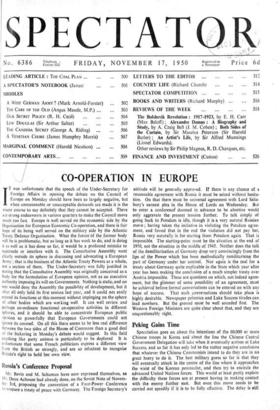Peking Gains Time
Speculation goes on about the intentions of the 60,000 or more Chinese troops in Korea and about the line the Chinese Central Government Delegation will take when it eventually arrives at Lake Success, and so far it has only led to the rather negative conclusion that whatever the Chinese Communists intend to do they are in ao great hurry to do it. The best military guess so far is that they will eventually attack in the centre of the line where it approaches the waist of the Korean peninsular, and then try to encircle the advanced United Nations forces. This would at least partly explain the difficulty these forces are at present having in making contact with the. enemy further east. But even this move needs to be carried out speedily if it is to be fully effective. The delay is still puzzling. It is true that the eventual refusal- of the Peking Government to take part in the Security. Council's discussion of General MacArthur's report on Chinese intervention in Korea might have been foreseen. It is true that the State Department's curious omission to grant visas to the Chinese Communist delegates, now on their way to discuss Formosa, until after the Congressional Election was over added something to the delays already involved in a journey from Peking to New York via Prague. It is also true that it takes time to deploy a force as large as that which the Chinese have now put across the Manchurian border into Korea. But the fact remains that some part of the delay at this critical stage in the Korean war has been deliberately created by the Peking Government. Even the suddenly launched and equally suddenly abandoned offensive in the early days of November may fall into its place in that it had the early effect of making the northward advance of the United Nations forces rather slower and more cautious. The Communists have had little time to think since the Inchon landing took place two months ago. Nor has there been much time for Moscow and Peking to sort out any differences of opinion they may have as to the next major move. In the circumstances they might well decide to make the best of a bad job by ensuring that large United Nations Forces shall be pinned down for a hard winter in the hostile hills of North Korea. Equally clearly General MacArthur's impatience to finish the job can be justified.



































